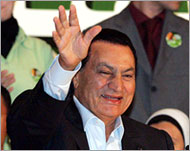Egypt defends curbs on poll monitors
The Egyptian government has defended its decision not to allow monitors into polling stations and vowed to prevent demonstrations on the eve of Egypt’s first contested presidential election.

President Hosni Mubarak, who has ruled Egypt for 24 years, is nearly certain to win Wednesday’s vote, but he has touted the election as a major step towards greater democracy in this US ally that has seen authoritarian rule for half a century.
The United States pressed for Egypt to allow independent monitors of the voting.
But this week, the elections commission rejected an administrative court ruling requiring observers inside polling stations.
Guarantees
Prime Minister Ahmed Nazif told reporters that the court’s ruling “is not binding to the commission, because under the constitution it (the commission) is the one that has the final word and not the court”.
 |
|
Previously, Mubarak ran |
Nazif said there were “many guarantees” of a fair vote, including the presence of candidates’ representatives at polling stations.
“Tomorrow is a new day in Egypt’s history. It will be a historic turning point,” Nazif said.
“We are all concerned to reflect a fair and free elections.”
Planned rallies
At least one pro-reform group is planning a demonstration on Wednesday in a main Cairo square to protest “corruption and oppression” and the continuation of Mubarak’s rule.
Nazif warned that such rallies would not be allowed.
“If there are demonstrations, they will be sabotaging the
elections,” he said.
“It’s the responsibility of the police and the security forces to secure the voters’ rights to cast ballots. But we have given instructions for self-restraint.”
In July, police and government supporters assaulted protesters as they tried to march in central Cairo, beating many.
Mubarak faces nine opponents in Wednesday’s voting, but only two of them are considered significant contenders – Ayman Nour of the al-Ghad party and Noaman Gomaa of the opposition Wafd Party.
|
“We are all concerned to reflect a fair and free elections” Ahmed Nazif, |
Previously, Mubarak ran unopposed in referendums in which voters could only vote yes or no on his re-election.
Mubarak called for other candidates to be allowed to run this year in what his government says is the first in planned reforms.
Complaints
In a relevant development, the leader of the Egyptian judges syndicate, Zakariya Abd al-Aziz, said he had received dozens of complaints from elections subcommittee heads saying that they have not received the phosphoric ink used to prevent voters from casting ballots in more than one polling centre.
This ink is necessary to ensure the integrity of the polling process, Abd al-Aziz told an Aljazeera correspondent.